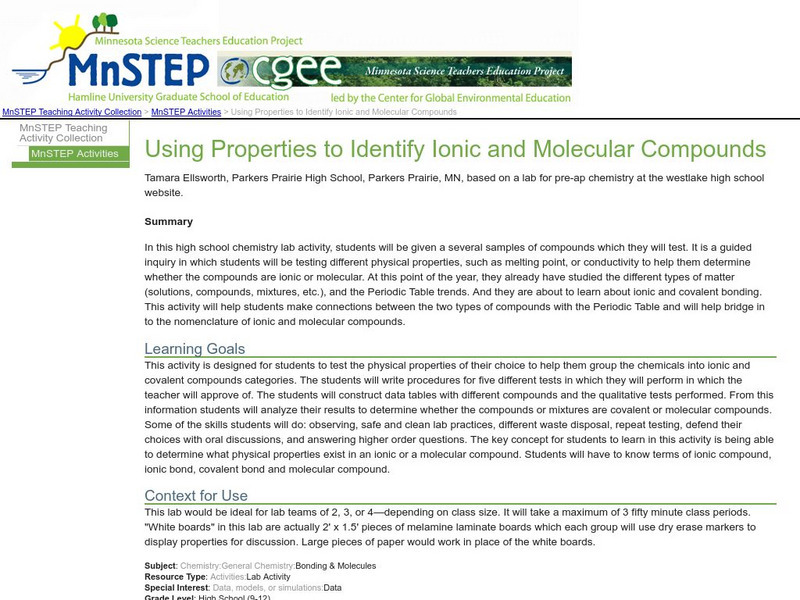Hi, what do you want to do?
Curated OER
A Very Simple Conductivity Meter
Students investigate the hardness of different water samples using the conductivity meter. In this chemistry lesson, students build their own meter following specific procedures. They identify an unknown sample of water.
Virginia Department of Education
Chemical Bonds
How are chemical bonds similar and how are they different? Provide your young chemists with the resources to more thoroughly understand the concepts of ionic and covalent bonds. Pupils research these topics, diagram examples of each...
Curated OER
Chemical Bonding
Students classify compounds as ionic or covalent. In this chemical bonding lesson plan, students experiment with 6 chemical compounds. They test physical properties such as the melting point, the solubility and the electrical...
Curated OER
Ion (Derstand) Bonding through Energy Level Diagrams
Ninth graders investigate ionic bonding through energy level diagrams. In this ion bonding lesson plan, 9th graders observe demonstrations to show energy level diagrams using magnets to represent the subatomic particles. Students fill...
Curated OER
A Very Simple Conductivity Meter
Students conduct a simple conductivity meter to test the ionic or non-ionic nature of water samples including one from their home.
Curated OER
Conductivity of salt Solutions
Students investigate the concentration level of solutions. In this math/science lesson, students identify three different ionic compounds. They predict the conductivity of each using their collected data.
Polar Trec
South Pole Ice Cream!
How can you turn an ice cream activity into a scientific investigation? It's easy if you know ionic compounds, heat transfer, and the exothermic and endothermic process. Learners will explore the science behind freezing, insulation, and...
Alabama Learning Exchange
Float or Sink?
Experiment with mass and density as scholars figure out what makes things float or sink. First, they watch a podcast introducing these concepts. Be sure to use the comprehension question to test their understanding. Young scientists...
Curated OER
How is the Strength of an Acid Determined?
Students study acids and how they can be measured. For this acid lesson students distinguish the properties that create strong and weak electrolytes.
Curated OER
Rusting-A Form of Oxidation
Students conduct an experiment to observe oxidation. In this chemistry instructional activity, students explain how rusting happens. They rank metals according to their conductivity.
Curated OER
Rusting-A Form of Oxidation
High schoolers observe the rusting process in the lab. In this chemistry lesson, students rank metals according to their conductivity. They give real world applications of this activity.
Curated OER
A Solution for Precipitation
Students predict the product of chemical reaction using the solubility rules. In this chemistry lesson, students balance ionic equation. They perform a lab to check if their predicted products are correct.
Curated OER
Flame Test
Students conduct a flame test on different substances. In this chemistry lesson, students predict the element present based on the color emitted during the flame test. They explain how different elements produce different colors.
Curated OER
Studying with Chemical Compounds
Young scholars create a foldable to help them remember topics on chemical compounds. In this physical science lesson, students differentiate ionic and covalent compounds. Given certain compounds, they identify whether it's ionic or...
Curated OER
Writing Chemical Formulas
Students study how to write chemical fomulas by reviewing the combinations atoms form into compounds. They write a procedure to test various substances and name the compounds and write formulas. As they construct models for formulas and...
Curated OER
Tie Dye
Students practice writing research proposals to test the color fastness of a dye once it has been exposed to a t-shirt. Each proposal needs details of experimental design, length of treatment, and means of cleaning the shirt. All...
Curated OER
Nervous Tissue
In this nervous tissue worksheet, students list and describe the functions of the nervous system and its two principle parts. Then they list and give the function and location of the six types of glial cells. Students also describe two...
Curated OER
An Introduction To Material Sciences
Students investigate the concept of molecular structure. They describe the behavior of simulated molecules and identify any dislocations in crystalline structures. They also define various related vocabulary words and use them in...
Utah Education Network
Uen: Conductivity and Bonding
Students will measure the conductivity of several compounds and solutions in order to predict the bond types (ionic or covalent) in the substances tested.
Science Education Resource Center at Carleton College
Serc: Using Properties to Identify Ionic and Molecular Compounds
A guided inquiry in which students test different physical properties, such as melting point or conductivity, to help them determine whether the compounds are ionic or molecular.
























